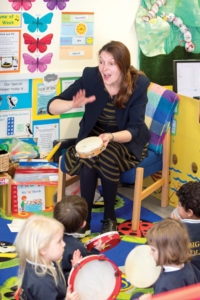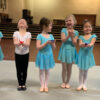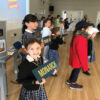Experienced music teachers Sam Dixon and Carolyn Hextall, who run the music department at Brighton College Nursery, Pre-Prep & Prep School, sing the praises for a subject that is becoming increasingly sidelined in many schools.
 Music helps us learn
Music helps us learn
No one doubts that learning music is fun. Sometimes, however, this concept can belittle the advantages that learning music brings and leads to it being given less emphasis in schools than other subjects. Research has shown that being taught music enhances skills such as concentration, memory and focus as well as offering physical and creative benefits to children. Similarly, an increase in the number of teaching hours dedicated to music and the provision of instrumental lessons for pupils can result in overall school improvement.
Busting the myth
There is a common misconception that those who achieve great results in music are naturally talented or gifted. It is a myth that often discourages children, or parents from families without a musical history, to embrace music as a subject. Music is a discipline just like sport or, let’s face it, any subject where success is achieved by children because they enjoy it and are therefore happy to dedicate time and energy to it. Enjoyment and dedication; these are two essential ingredients.
An early start
It is never too early for children to enjoy music and to start performing. Children as young as three can start to learn written notation presented in a fun, active way. Introducing them to the ‘Musical Family’ of Grandpa Semibreve, Daddy Dotted Minim and Baby Crotchet help to bring the notes alive. They learn the musical value of each note by physically moving in a way that suits the different characters; slow footsteps mark out the four beats of Grandpa Semibreve, whilst Daddy Dotted Minim loves to waltz – the children absolutely love the characters and the information sticks.
Keep it moving
Methods such as this introduce the body as an instrument and our youngest pupils begin to connect music with movement, the mind with the body. Note recognition becomes physically embodied at a tender age and this helps to combat any trepidation surrounding their learning to ‘read’ music when they are older. Pulse and rhythm can also be embedded as early as possible through the use of dance along videos and regular opportunities to use simple percussion instruments or even the banging of a humble bucket. Singing is fundamental to the development of ear training
and use of the solfege system helps children to improve their vocal control and develop a strong understanding of the musical scale.
The show must go on
The fundamental principle of performance underpins music teaching at all levels and learning an instrument or singing gives children the opportunity to become involved in musical ensembles, performing with one other, and to explore a wide range of repertoire. Participation in ensembles as varied as orchestras, jazz and swing bands, percussion groups, pop groups, guitar, classical and piano ensembles are a brilliant ways for children to develop the important skills of listening, responding and analyzing. They allow children to work on the art of preparation and offer them vital performance opportunities on all scales.
Technology in music
When composition is introduced at a very young age, through call and response and simple improvisation children respond quickly to the introduction of songwriting, writing music to accompany films or music from particular genres. In a world where so much music is produced by technology, an understanding of notation and composition software such as Cubase and Sibelius is important and should be encouraged.
Making connections
Listening to a wide range of music and putting it into a historical and cultural context helps children to appreciate the links between music and other subjects being learnt at school.
So, when we listen to Baroque music and introduce pupils to the towering genius J.S. Bach, we consider what else was happening at that time. Who was on the throne in England and what was happening in Bach’s hometown? Was he a practical joker like Mozart or, like Handel, did he have a legendary temper? Researching contemporary pieces which use similar techniques, for example Goldfinger’s ‘Superman’ which uses a Baroque ground bass, makes their learning feel more relevant and accessible.
Onwards and upwards
Learning music is a three way process between parent, pupil and teacher. Each one relies on the other for their commitment, participation and development. Parents are key in providing a regular, realistic practice time for children who learn an instrument and ensuring it takes place in an appropriate environment. They can also help by exposing their children to a smorgasbord of different musical styles; it could be as easy as exploring the different channels on the radio, attending concerts or joining local choirs and community music groups. Music is such a wonderful thing to explore with children and parents really do not have to be the expert. If there is something you enjoy, share it with your children. An enthusiastic response to their practice efforts or dancing along to your favorite tunes is all it takes to get started.
Sam Dixon and Carolyn Hextall run the music department at Brighton College Nursery, Pre-Prep & Prep School educating over 500 pupils between the ages of three and 13 in curriculum music. Their provision is supported by a body of over 30 visiting instrumental music teachers who deliver individual and group lessons to the children.
www.brightoncollege.org.uk

 amp
amp
 The physical benefits of dance lessons are obvious (and plentiful!). The physical act of moving your body causes your heart to beat faster and pump blood around your body, which helps to increase your cardiovascular fitness. In children’s dance classes, the repetition of exercises and routines helps to improve stamina and muscle memory. Regular dance lessons can help to strengthen muscles and improve balance whilst working towards developing flexibility and mobility. These are especially important for little bodies to help them become stronger, and to develop a good posture, alongside their co-ordination and motor skills.
The physical benefits of dance lessons are obvious (and plentiful!). The physical act of moving your body causes your heart to beat faster and pump blood around your body, which helps to increase your cardiovascular fitness. In children’s dance classes, the repetition of exercises and routines helps to improve stamina and muscle memory. Regular dance lessons can help to strengthen muscles and improve balance whilst working towards developing flexibility and mobility. These are especially important for little bodies to help them become stronger, and to develop a good posture, alongside their co-ordination and motor skills. Just as important as the physical benefits, the social aspects of a dance class also make it an important activity for children. Children learn to work with others who may not be in their class or may even go to a different school. Aside from the obvious benefit of making new friends, they learn how to communicate with other children, and how to share ideas with children who may not agree with them, whilst being kind to each other. They get the opportunity to regularly perform in front of their peers and get feedback and praise that contributes to a development in their self-esteem. Dance classes encourage children to learn how to follow instructions and use their problem-solving skills to approach tasks that they may find difficult.
Just as important as the physical benefits, the social aspects of a dance class also make it an important activity for children. Children learn to work with others who may not be in their class or may even go to a different school. Aside from the obvious benefit of making new friends, they learn how to communicate with other children, and how to share ideas with children who may not agree with them, whilst being kind to each other. They get the opportunity to regularly perform in front of their peers and get feedback and praise that contributes to a development in their self-esteem. Dance classes encourage children to learn how to follow instructions and use their problem-solving skills to approach tasks that they may find difficult. panto. And even though we all know who wins, there is nothing quite so uplifting as seeing these morals reaffirmed. But not so fast, there’s tension, there’s anticipation, there’s always what if… So the shared sense of happiness that eventually fills the auditorium is palpable, and for children – the triumph of good over evil is a powerful message of hope and inspiration.
panto. And even though we all know who wins, there is nothing quite so uplifting as seeing these morals reaffirmed. But not so fast, there’s tension, there’s anticipation, there’s always what if… So the shared sense of happiness that eventually fills the auditorium is palpable, and for children – the triumph of good over evil is a powerful message of hope and inspiration.








